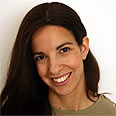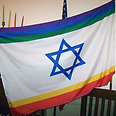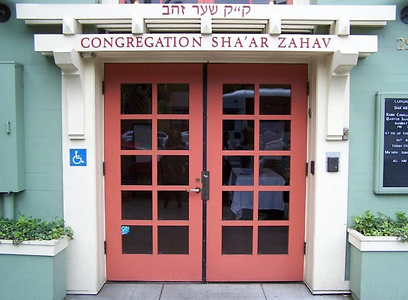

And after I finally adapted to the ambience which is so foreign to that of my childhood upbringing in Bnei Brak I discovered that this was only the beginning for me, an ultra orthodox Israeli woman, meeting the gay Jews of the city.
"It is much easier for me to say 'I'm lesbian' than 'I'm a Zionist'," said Rivkah Weiner just seconds after I entered an institution that only exists in the US – the gay temple.
The sign outside reads "Congregation Sha'ar Zahav" in Hebrew and the gay pride flag is the only symbol that makes it obvious that this is no regular orthodox, reform or conservative community.

Congregation Sha'ar Zahav (Photo: Yoav Friedman)
The Sha'ar Zahav community numbers 600 members. Homosexuals, lesbians, bisexual, transgender and a few other definitions I was not aware even existed. Inside, a verse is written next to the temple's ark: "How good and pleasant it is for brothers to sit together." Later a thought was given to equality and the word "sisters" was added.
After picking my jaw up off the floor, I managed to regain enough concentration to focus on the (female) temple manager who proudly told me of the lively community, the gay seder they held last Passover ("exodus from slavery to freedom, have you seen a gay person who doesn't identify with that message?") and issues and conflict that come with congregation life, like the status of non-Jews within the community.
The members of the gay community apparently do not automatically choose to belong to the Sha'ar Zahav congregation. They are welcome anywhere and as the temple manager told me "there are those who prefer to go to Chabad."
At that moment, the dissonance between Israel and the US could not have been greater. I tried to close my eyes and imagine a Chabad house with worshippers of such unconventional orientation and I just could not manage to. The image would not appear.
It is a well known secret that in Israel the majority of the gay community is not very proud of its Jewishness.
Those born to a family where religion played a significant role, usually completely sever their ties with religion in what is seen as a natural move the moment they come forward with their sexual orientation.
And while there are organizations that try to put their finger in the hole in the dam, this is the current reality in most cases. Yet to the congregation in San Francisco this attitude is just incomprehensible. "I just don't get it," admits the congregation leader.
Feel foreign, alienated
"You can desecrate the Shabbat and pray in a synagogue, which many people do there (in Israel). But you can't be gay and do the same thing? The Tanach can be read in many ways, it all starts from whether you feel like you belong."
To the three people who founded the congregation, belonging and taking part in religious was obvious. They came from orthodox families, could have left it all behind but consciously made the decision not to do so.
Not to give up on what they believe is just as much theirs as anyone else's, and eventually they succeeded to bring about a perceptual revolution that led to them being accepted everywhere, more specifically, in every synagogue in every community in the area.
The question is, can it be done in Israel. Right now there is only a small kernel, for example the "gay minyan" which aligns itself with orthodox Jewry. Yet how many gays give up, remain torn or feel foreign and alienated? In my opinion, nearly all of them.
The long and complicated road that the gay Jewish community of San Francisco has travelled eventually led the Jewish establishment to recognize them as equals among equals.
The question remains, is it possible that someone in Israel will be prepared to commit not only to the meaning of their sexual identity but their religious identity as well and who will be willing to lead the transition? Time will tell.















